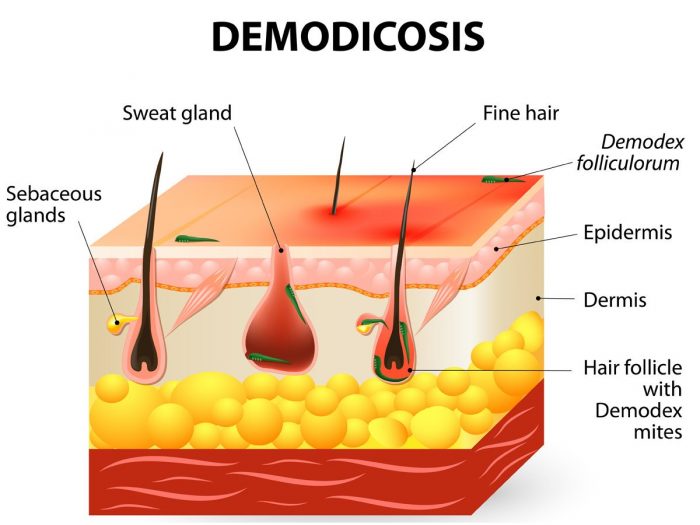Scientifically known as demodicosis, demodectic mange (or red mange) is an inflammatory disease caused by an inability to properly handle a small mite that exists on almost all dogs fur, Demodex Canis. In most healthy dogs, particularly those that are regularly sheltered, fed, and have a strong immune system, the number of Demodex Canis is kept under control and doesn’t bother dogs very much, except for some minor scratching or itchiness. [1]
However, if a dog is suffering from malnutrition, abuse, or a severely compromised immune system, those mites can begin to reproduce rapidly and start to wreak havoc on the canine’s fur. This can result in hair loss in small patches and mild irritation but can be as serious as widespread hair loss, infections, and life-threatening complications. For our beloved pets, it can be difficult to see them going through so much pain without being able to help.
There are a number of prescription medications and creams that you can get from veterinarians, but there is always the risk of side effects, not to mention the cost. Fortunately, there are a number of home remedies for demodectic mange that are easy and effective! That being said, in cases of severe demodectic mange that could possibly be life-threatening for the animal, seeing a veterinarian is always recommended, just to be sure. [2]

Demodicosis is diagnosed if there is a high level of mites in the hair follicle. Photo Credit: Shutterstock
Diagnosis
Diagnoses for demodectic mange involves skin scraping and, sometimes, hair sample of the infected area. The skin scraping is sent to labs for a proper biopsy, using microscopic channels. Only if the biopsy shows a presence of mites along with skin lesions, it is considered a case of demodectic mange, otherwise not. These mites are tiny, alligator-like creatures that cannot be seen with naked eyes, and therefore cannot be detected without a lab testing.
Veterinarians are also of the opinion that older dogs with demodectic mange should be tested for other related illnesses like Cushing’s disease, cancer, hypothyroidism, and other bacterial infections. [3]
